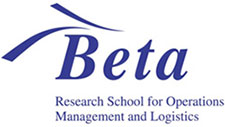On Friday, February 15, 2019, Sajjad Rahimi-Ghahroodi will defend his PhD thesis “Integration and Coordination in After-Sales Service Logistics”. This thesis has been supervised by prof.dr. W.H.M. Zijm and dr.ir. A. Al Hanbali. The ceremony will take place in the Prof.dr. G. Berkhoff hall (WA 4) of the Waaier building of the University of Twente at 14:30 hrs.
Abstract
Maintenance and after-sales service logistics are important disciplines that have received considerable attention both in practice and in the scientific literature. This attention is related to the often high investments and revenues associated with capital-intensive assets in technically advanced business environments. Different maintenance services such as inspections and preventive maintenance activities are executed with the goal to maximize the availability of these expensive assets. However, unavoidable failures may still happen, which means that, in addition to preventive maintenance and services, repair actions (corrective maintenance) are necessary. Spare parts, service engineers and tools are typically the main resources for executing the repair actions and their availability has a major impact on overall system downtime. In this dissertation, we analyze a multi-resource after-sales service supply chain consisting of a service provider and an emergency supplier. The service provider is contractually responsible for the timely repair of some randomly failing capital intensive assets. To execute a repair, the service provider needs both service engineers and spare parts to replace the malfunctioning parts. In case of spare parts stock out, the service provider can either wait for the regular replenishment of parts or decide to hand over the entire repair call to an emergency supplier. For the latter case, a contract between the service provider and the emergency supplier is necessary to specify the compensation. In the first part of this dissertation, we focus on the optimal integrated planning of spare parts and engineers, considering an asset availability constraint. We evaluate the system performance using Markov chain analysis and queueing models, and employ different optimization algorithms to jointly determine the optimal capacity of the resources. This integrated planning results in considerable cost savings compared to the separate planning of spare parts and engineers. In the second part, we investigate the best contract the supplier can offer to the service provider. Furthermore, we propose different coordinated contracts to achieve optimal revenues for both partners in this after-sales service supply chain, under both full and asymmetric information scenarios. Cooperative games, the dominance of one party over the other (Stackelberg game), and information sharing aspects are the tools included in the second part of this dissertation.
